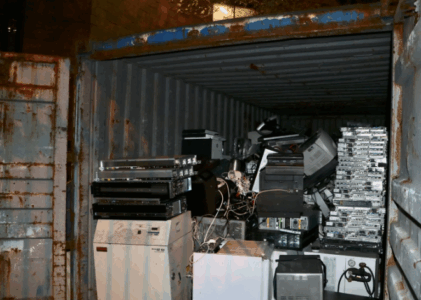László Molnárfi and Toto Daly
In the modern age of sustainability, higher education institutions are taking increasing steps to reduce their environmental footprint and College is no exception. From tracking inventory across departments to aligning waste management practices with evolving regulations, Trinity News has gained insight into how the university is handling this challenge.
On 21 October 2024, a staggering volume of discarded electronics behind the Arts Block were discovered by Trinity News journalists, prompting an in-depth inquiry. Among the items were computer servers, printers, displays, cables, keyboards, and mice, all thrown into a skip from the Panda recycling company. Just a five-minute walk away, behind College Park, a similar scene unfolded: more electronics, accompanied by chairs and lab equipment, piled high and awaiting disposal.
At the Trinity Enterprise and Technology Campus, the College’s primary skip site, a smaller electronics skip from WEEE Ireland was overflowing with keyboards, computer mice, cables, and even a display. While some items showed signs of wear and tear, their overall condition was surprisingly good—many were still functional or easily repairable, raising questions about why the items were disposed despite their potential for reuse.
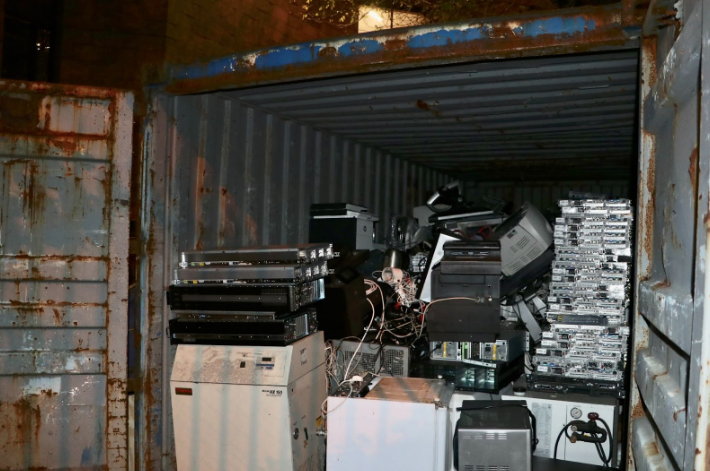
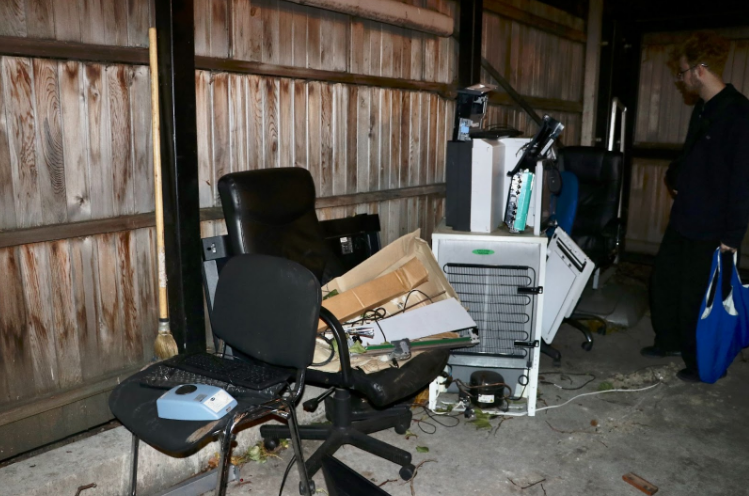
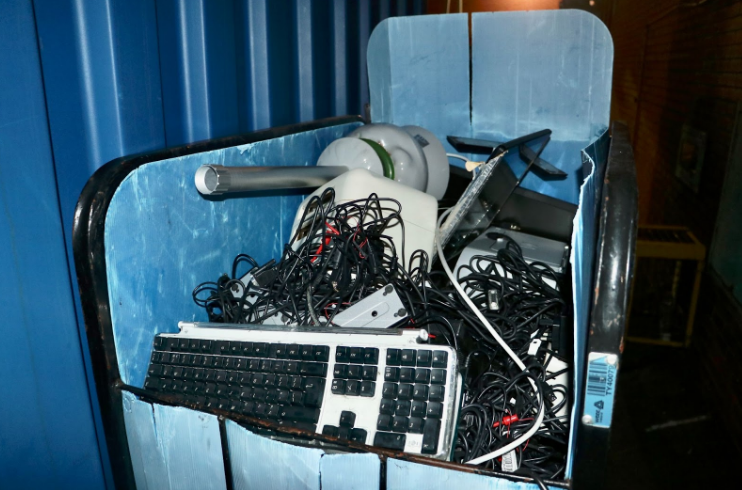
This was not the first time we came across questionable waste disposal practices. We observed, on the 10 October 2024, an Estates and Facilities (E&F) truck drive into Trinity Enterprise and Technology Campus. The truck reversed to the back of a skip marked “Wood Items” and we noticed a ladder and several chairs being discarded. Curious and unwilling to see usable items go to waste, we approached the truck and retrieved the ladder and 21 deck chairs from among the disposed items.
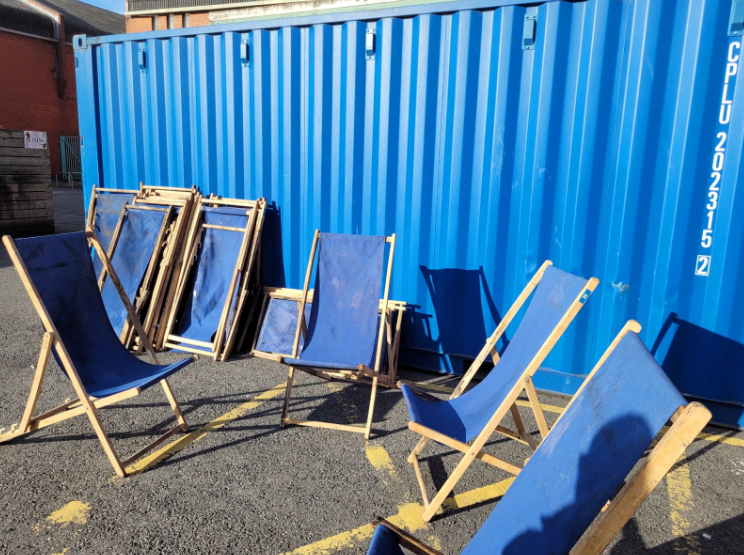
The deck chairs, initially damp from improper storage, were taken home to dry in our garden. The sight of them spread out resembled a concert setup. Upon inspection, the chairs appeared to be of good quality, made with FSC-certified wood and strong fabric seats. A quick search for similar products revealed a price range of €80 to €165 per chair. Based on these figures, the estimated cost of 100 such chairs would have been between €8,000 and €16,500.
We contacted Panda, the skip provider for College, to inquire about their practices. Panda confirmed that items from skips, regardless of their condition, are separated by material type and sent for recycling rather than reuse. As well as this, the other waste disposal supplier for College specifically used for electronics of smaller stature, WEEE Ireland, is also a recycling-only company.
Once they are in the skips, workers at College are instructed not to touch the waste. Everyone knows the phrase ‘reduce, reuse, recycle’; it seemed to us that College seemed to have forgotten those first two words ‘reduce and reuse’. Upon reaching out for a comment from College, we discovered a complex picture, with promising developments and some shortfalls in waste management.
Waste disposal is a significant expenditure for the College, costing approximately €250,000 annually. A tracking system is in place to monitor waste tonnage, providing valuable data for assessing waste trends. While the current system does not track disposal at an item level, it does collect weight-based records—a necessary metric as disposal fees are calculated per tonne.
Determining whether an item should be discarded, repaired, or repurposed currently rests on the shoulders of individual departments. This could be the culprit for the deck chairs we witnessed being thrown away.
As seen, there is room for improvement. In recognition of this, College is developing a roadmap aimed at standardizing the evaluation process for implementation in 2025. This new framework will provide clear guidelines to assess the condition of items and determine the best course of action. Additionally, College has a more informal system for repurposing items no longer needed, facilitated through a Yammer group.
There are some exceptions. Specifically, for electronics. College’s Web Asset Portal serves as a key tool for tracking IT and laboratory equipment. This portal records important details such as purchase information, current location, and eventual disposal methods. When it comes to IT equipment, disposal is carefully regulated. Staff members are required to fill out forms detailing disposal information, ensuring alignment with the College’s adherence to current waste regulations.
Larger clear-outs, such as those managed through the logistics department, involve contracted services to ensure proper segregation, disposal, and documentation. That being said, we have seen that the electronic equipment thrown out could have been reused, highlighting that the institutional ethos is ‘recycle’, not ‘reduce and reuse’. It is hoped that the standardised evaluation process will help as well as that the use of the Yammer group can be expanded.
The College’s sustainability initiatives are guided by policies like the Sustainability Policy and the Waste Management Policy. The former emphasizes the minimization and reuse of products and materials, while the latter ensures recycling and responsible disposal practices. Both are under review to align with the implementation of the EU Circular Economy Action Plan. To transpose it to national legislation, Ireland’s National Waste Management Plan for a Circular Economy 2024-2030 will introduce stricter measures to limit waste generation and promote resource reuse.
Responsibility for overseeing compliance will fall to the Estates and Facilities (E&F), which manages waste disposal. However, with the increased scope of responsibilities, the department’s resourcing is under review to ensure the task is adequately supported.
In a statement to Trinity News, current president of the TCDSU, Jenny Maguire, claimed that College “only cares about environmentalism when it takes minimal effort and little change to the status quo”
“[Trinity] does nothing to foster or support a so-called college community to engage in environmental practices. Instead, it invests in apps and useless themed-weeks that both provide and are used by little. To create a system that reuses and reduces the materials we use would take creativity and initiative, something the current sub-sub-sub-sub-committees struggle with” Maguire continued.

